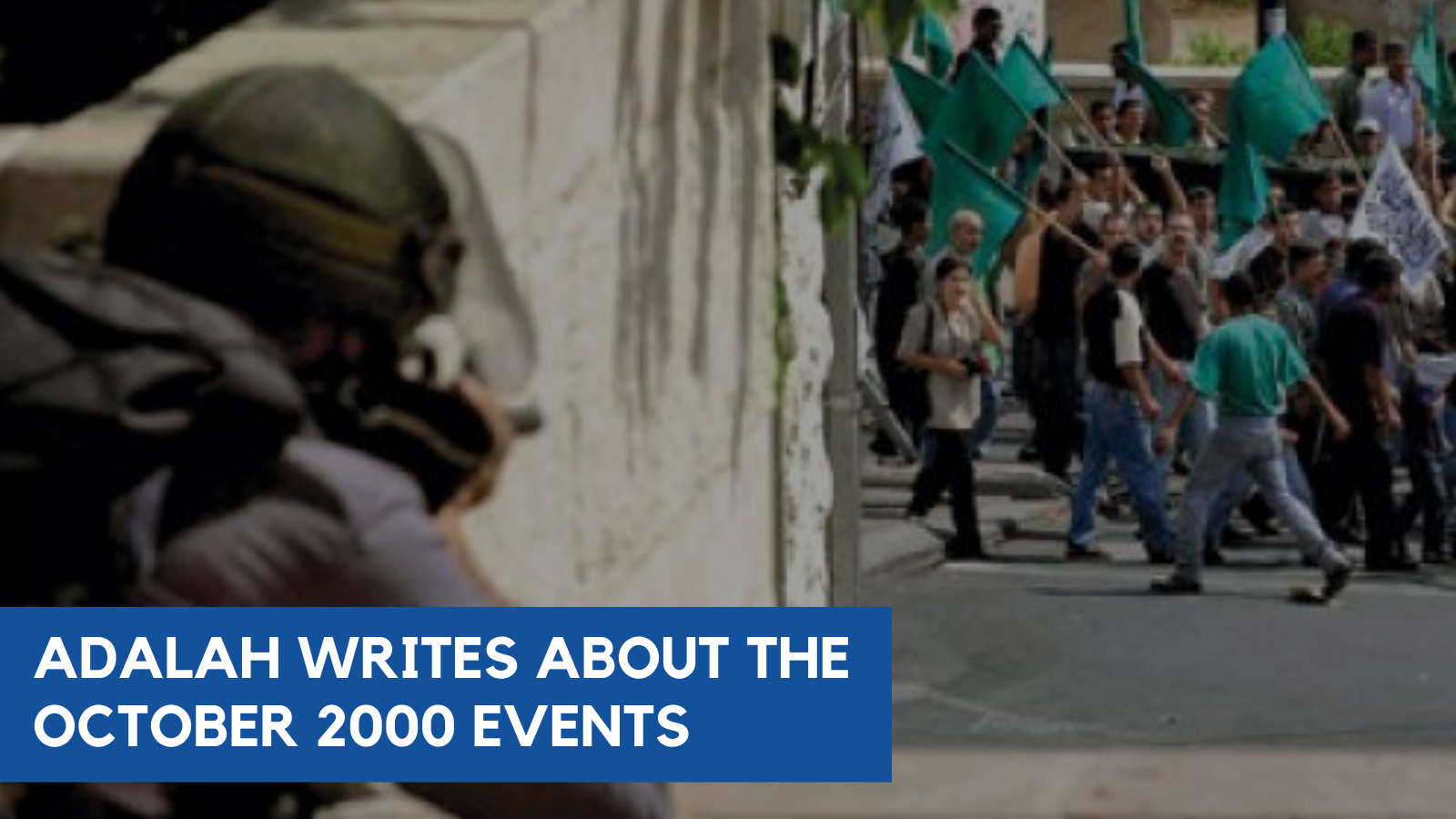The October 2000 Killings (October Uprising)
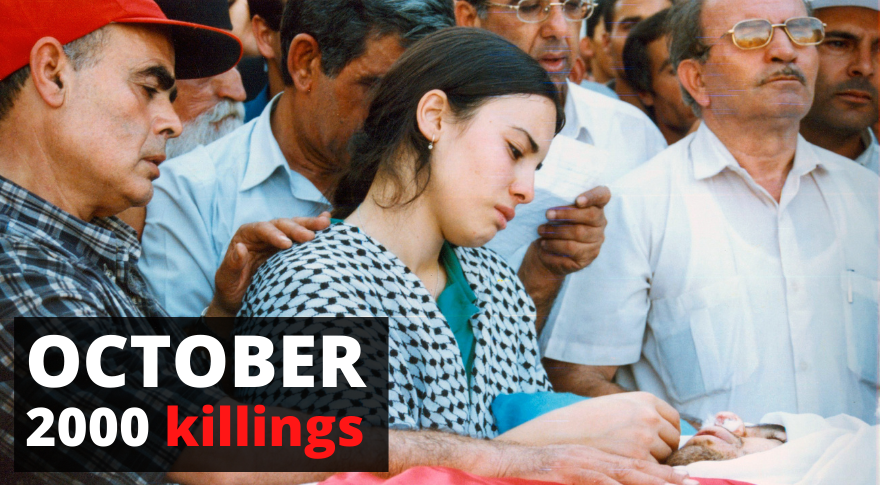
The funeral of Asel Asleh – one of 13 Palestinians killed by Israeli police - in Arrabe, October 2000. (Photo: Adalah)
Between 1 and 8 October 2000, Israeli police officers shot dead 13 young unarmed Palestinian men, 12 citizens of Israel and one resident of Gaza. The 13 deaths and hundreds of injuries occurred when Israeli police opened fire on Palestinian citizens who had taken to the streets to protest against the Israeli military’s killing and wounding of scores of Palestinians in the Occupied Palestinian Territory (West Bank and Gaza) at the outbreak of the Second Intifada. Although the use of lethal force against unarmed protestors is illegal, and none of the individuals shot posed a danger or threat to life to the police or to others, all case files on the killings have since been closed without any of the police officers, commanders, or political leaders responsible being prosecuted or otherwise held to account. The October 2000 killings – also known as the October 2000 Uprising – underscored how precarious is the citizenship status of Palestinian Arab citizens, and how readily the state perceives and treats them as “enemies within”.
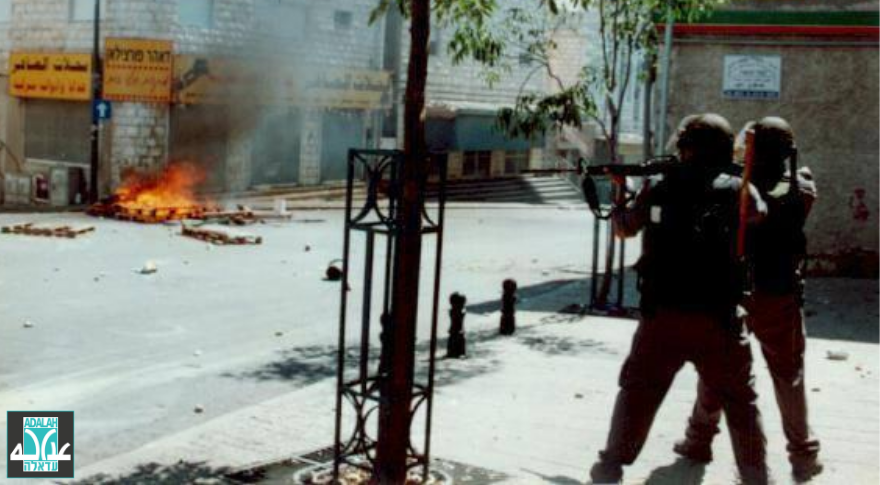
During the protests, police and special sniper units used live ammunition, rubber-coated steel bullets, and tear gas against the protestors, in violation of the law and even internal police regulations. Most of the Palestinian citizens of Israel killed or seriously wounded by Israeli police were hit in the upper parts of the body, in the head, neck or chest.
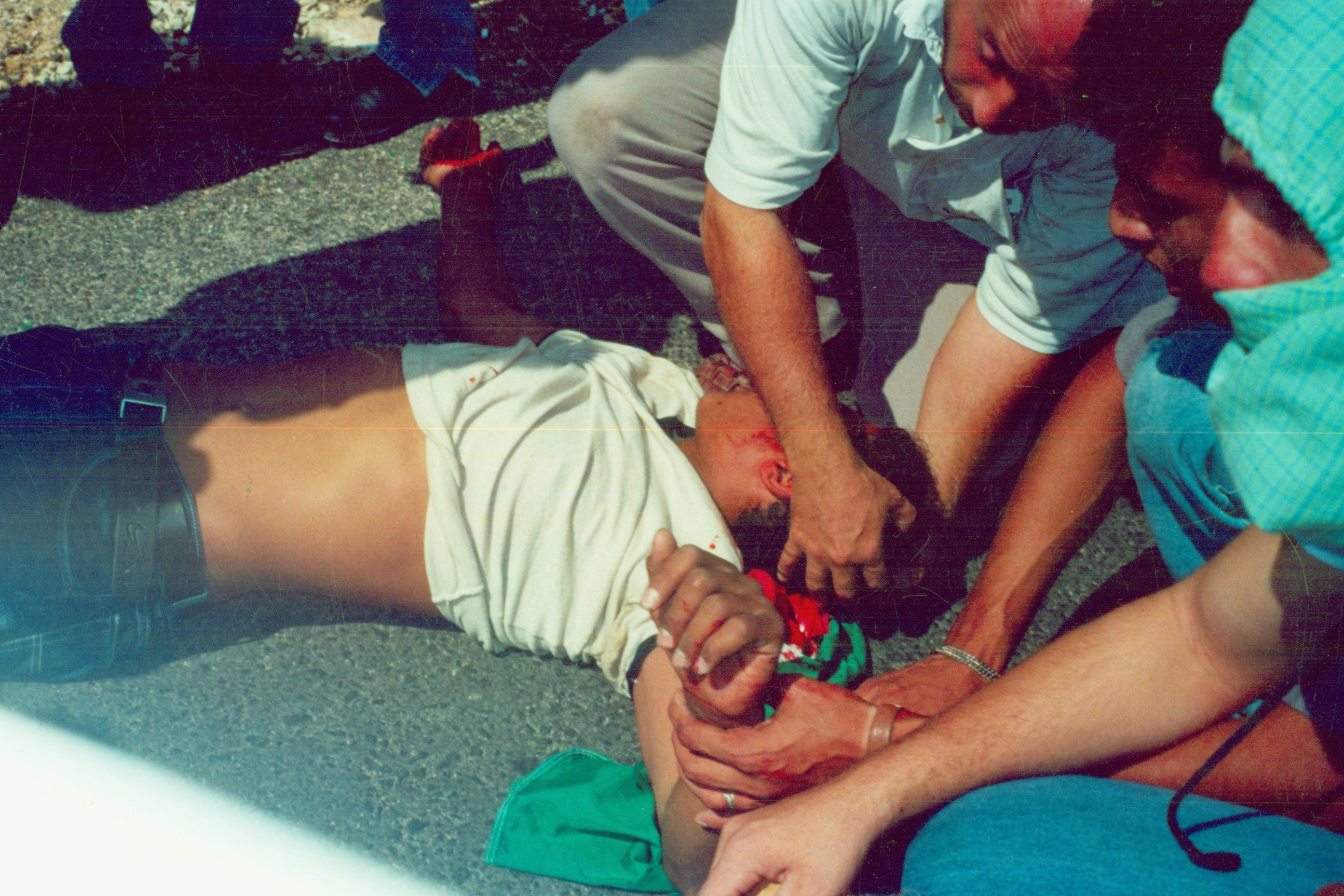
Palestinian citizens of Israel provide initial aid to an individual wounded in the head during the October 2000 events. (Photo: Adalah)
The actions of the police command suggested that it was engaged in a military operation (the purpose of which is to defeat an enemy) and not a police operation (the purpose of which is to maintain public order and peace among the citizenry). In the months and years that followed, Adalah redirected a significant part of its activities to the search for answers and justice for the October 2000 killings.
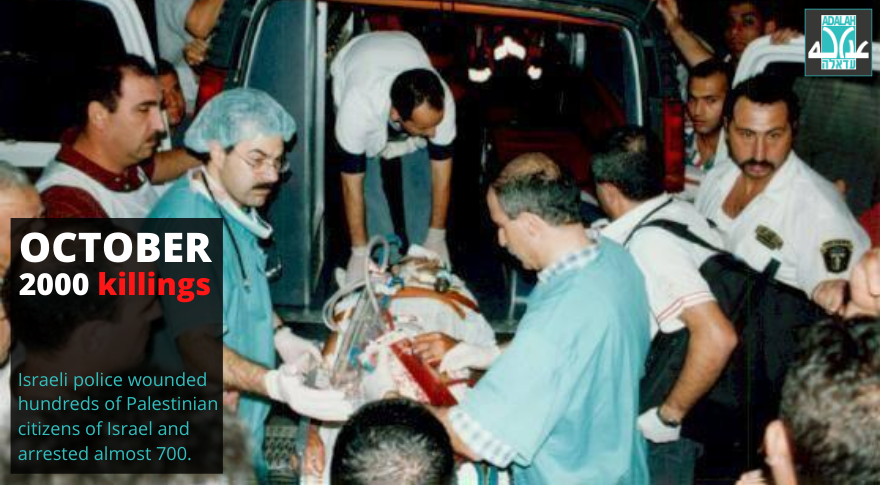
The Or Commission of Inquiry: No justification for lethal fire
On 8 November 2000, following enormous public pressure, an official commission of inquiry was established into the October 2000 events, referred to as the “Or Commission” after former Supreme Court Justice Theodor Or, who headed the body. Its primary mandate was to “investigate the sequence of events and... determine its findings and conclusions regarding what occurred during these events and regarding the causes leading to their occurrence at that time.”
The High Follow-Up Committee for Arab citizens in Israel and the families of the 13 Palestinians killed in the protests before the Or Commission appointed Adalah as their official legal representative. In preparation for its work before the commission, Adalah sent a delegation to Northern Ireland and London for strategic legal consultation with lawyers who had represented bereaved families before the Bloody Sunday and Stephen Lawrence Inquiries, due to the relevant parallels, including the killing of demonstrators, the lack of police investigations, and institutional racism.
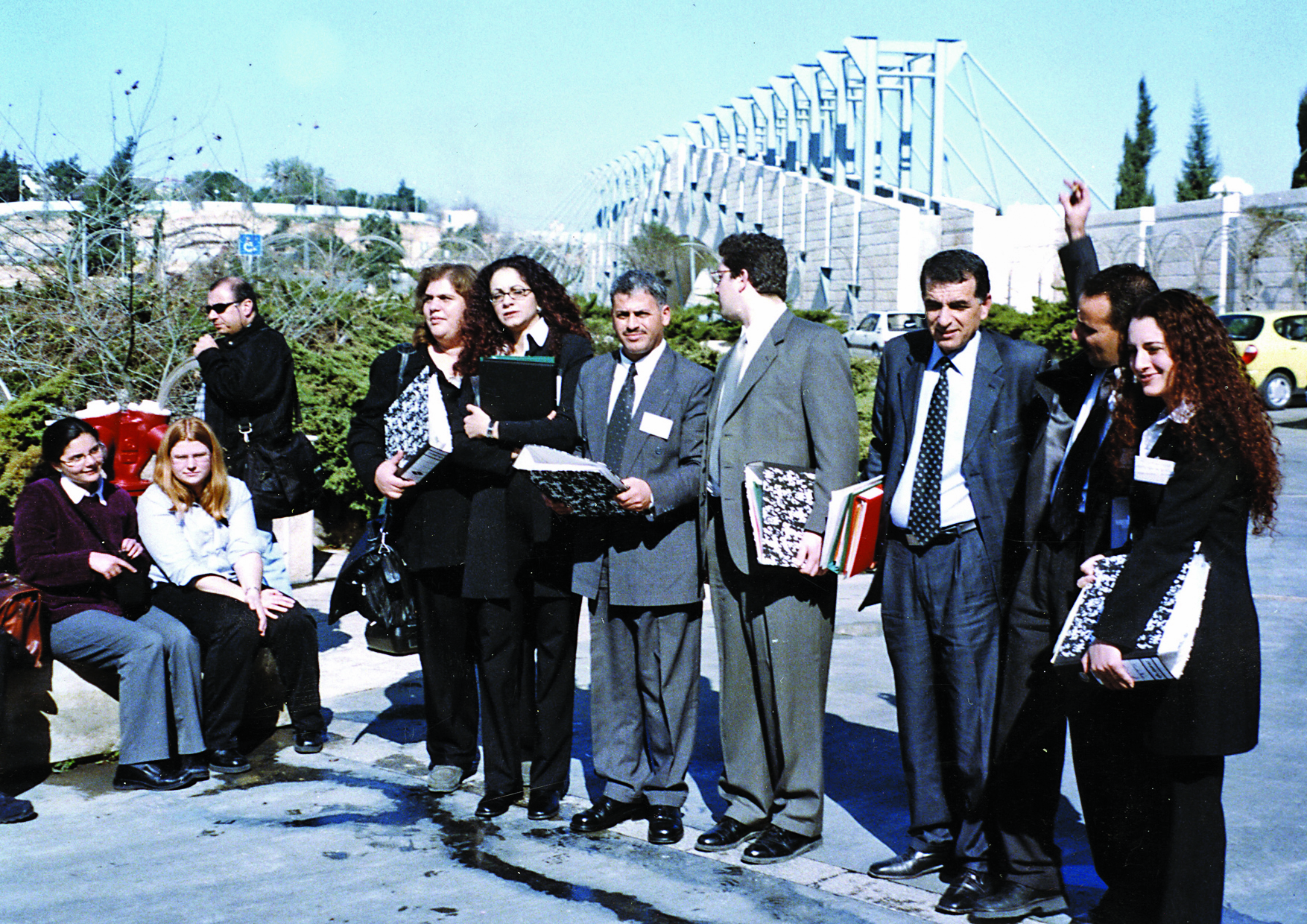
Adalah’s team submitting legal materials to the Or Commission in January 2001. (Photo: Adalah)
Adalah’s first actions before the Or Commission included submitting legal challenges to its mandate, filing several successful legal motions regarding its working procedures and receipt of evidence, and sending a letter concerning a recommendation to exhume the bodies of some of the victims. Adalah’s legal team also submitted a large quantity of evidentiary material to the commission, including over 100 eyewitness testimonies, physical evidence (e.g. maps, photographs, video recordings, and medical reports) and expert opinions, and attended dozens of sessions over the course of three years. It further provided the commission with extensive information about discrimination against Arab citizens of Israel. Adalah filed scores of legal challenges against the commission’s decisions, as well as three Supreme Court petitions based on testimonies given before the commission, including petitions to demand access for the families of four of the victims to their autopsy reports, and the removal or suspension of individual police commanders.
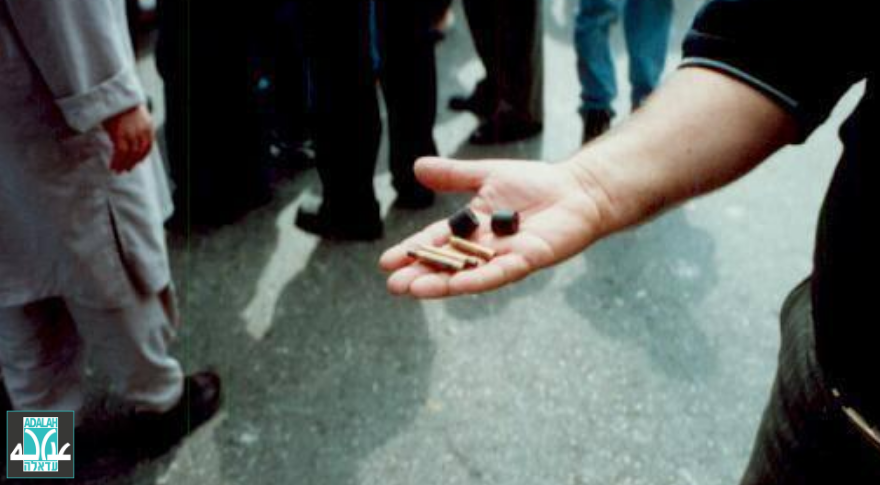
The Or Commission published its findings on 1 September 2003. (CLICK HERE for the English-language summary). The commission found that there had been no justification whatsoever for the gunfire that caused the 13 deaths. It discovered that snipers had been used to disperse demonstrations - for the first time since 1948 - and that lethal sniper fire was illegal and breached internal police regulations governing the use of live fire. It similarly determined that the firing of rubber-coated steel bullets, which had fatal consequences, was against police regulations.
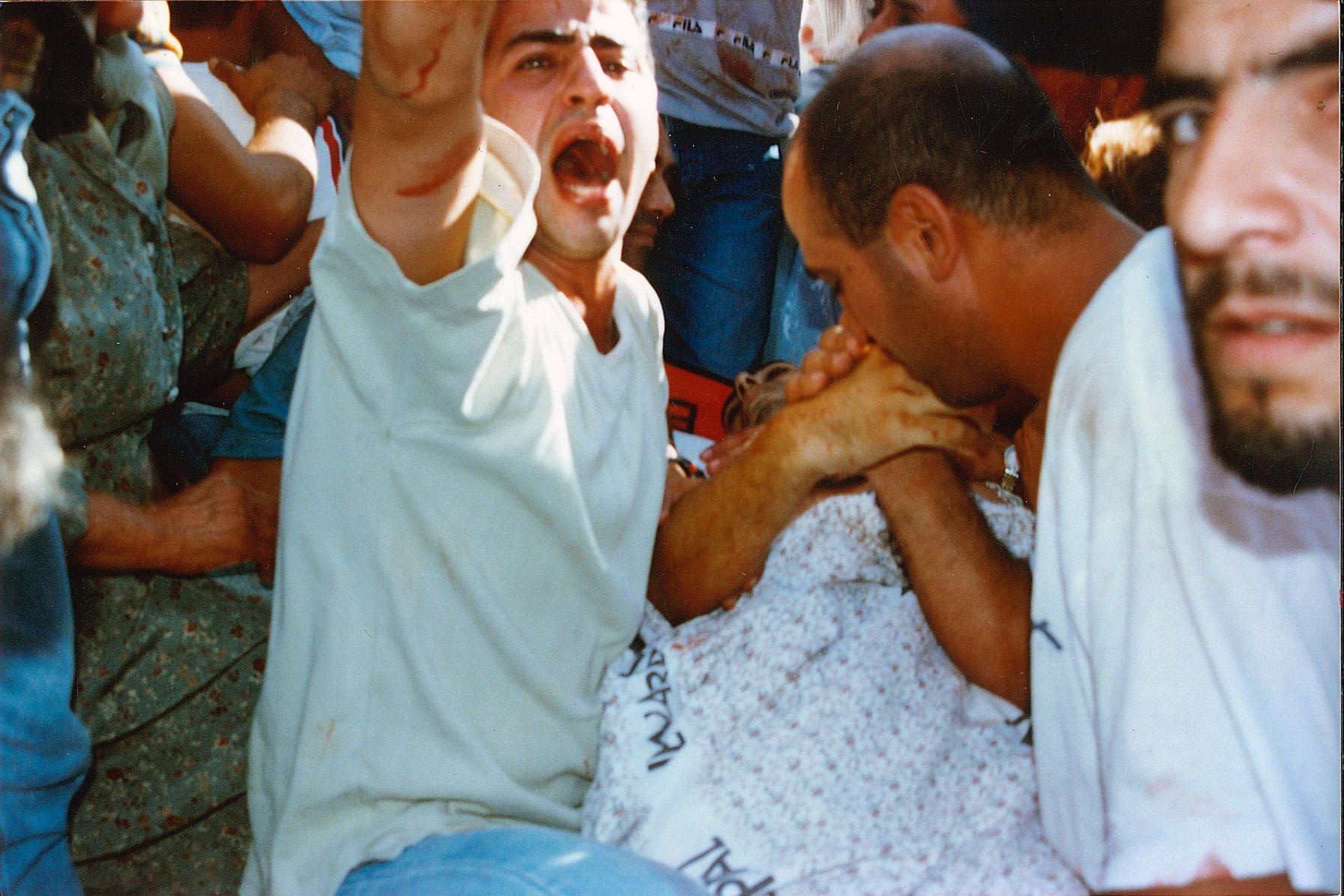
Palestinian citizens of Israel provide emergency assistance to an individual wounded during the October 2000 events. (Photo: Adalah)
It concluded that in none of the 13 cases had there been a genuine threat justifying the deadly gunfire, and issued recommendations to the political and operational leaderships concerning their involvement in the events. However, while the commission found police officers and commanders responsible or culpable for individual deaths via orders to use snipers and live ammunition, the report lacked conclusive recommendations to indict those responsible for the killings at all levels.
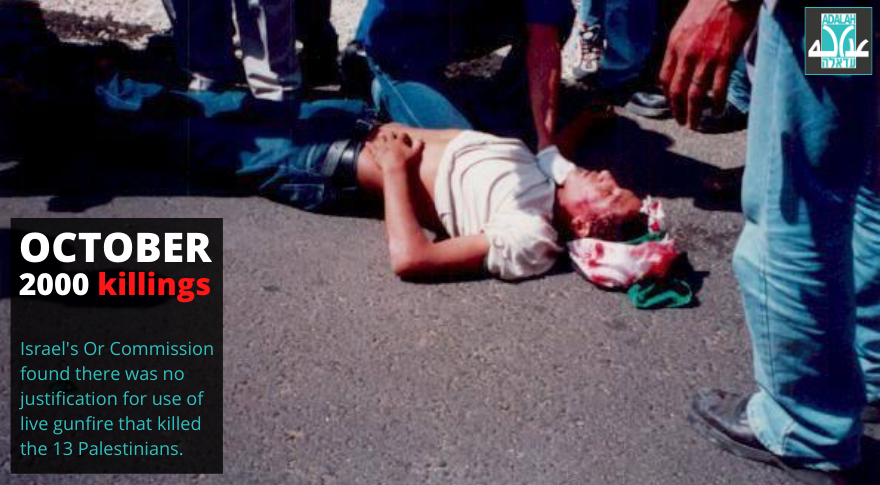
The commission also made the general recommendation that the Israeli police must radically alter the way they relate to Arab citizens. A substantial part of the report related to the negative and illegal role of the Shin Bet internal security service in determining government policy towards Palestinian citizens of Israel.
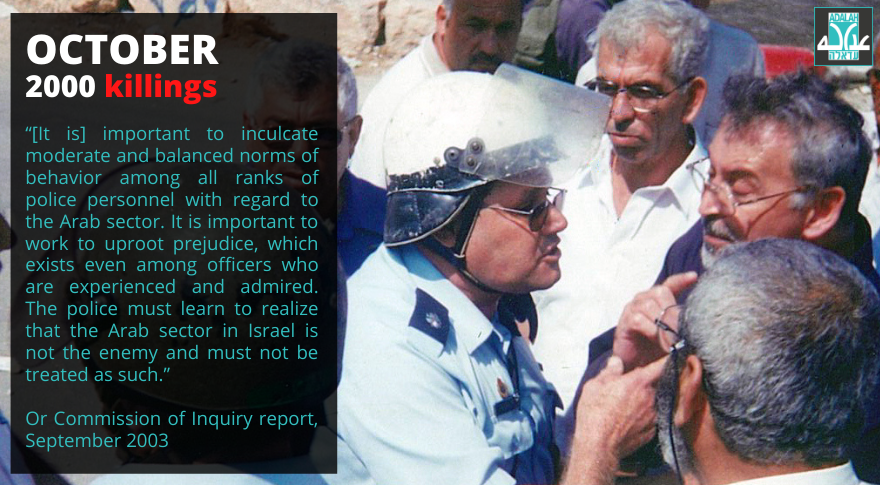
On a broader level, the Or Commission’s report was the first official legal document published since 1948 to address historical discrimination against Arab citizens of Israel. The commission determined that Arab citizens should be granted “true equality” and that the state should strive to close gaps in education, housing, industrial development, employment and services, especially in the case of the Arab Bedouin. The commission also adopted Adalah’s arguments regarding discrimination in land, recommending that the principle of just land allocation and suitable planning be embraced by the state to avert the need for illegal building in Arab towns, villages, and neighborhoods. Although the Or Commission did not take a stand on the question of the collective rights of the Arab minority in Israel, it did determine that, “the authorities must find ways to enable Arab citizens to express their culture and identity in a dignified fashion within the public sphere.” In general, in its initial response to the commission’s report, Adalah took the position that, notwithstanding its significant reservations, the commission’s recommendations should be acted on and promoted. Indeed, Adalah has used some of the report’s positive recommendations in several of its subsequent petitions to the Israeli courts. However, the recommendations have not been implemented and the report was widely attacked by Jewish Israelis.
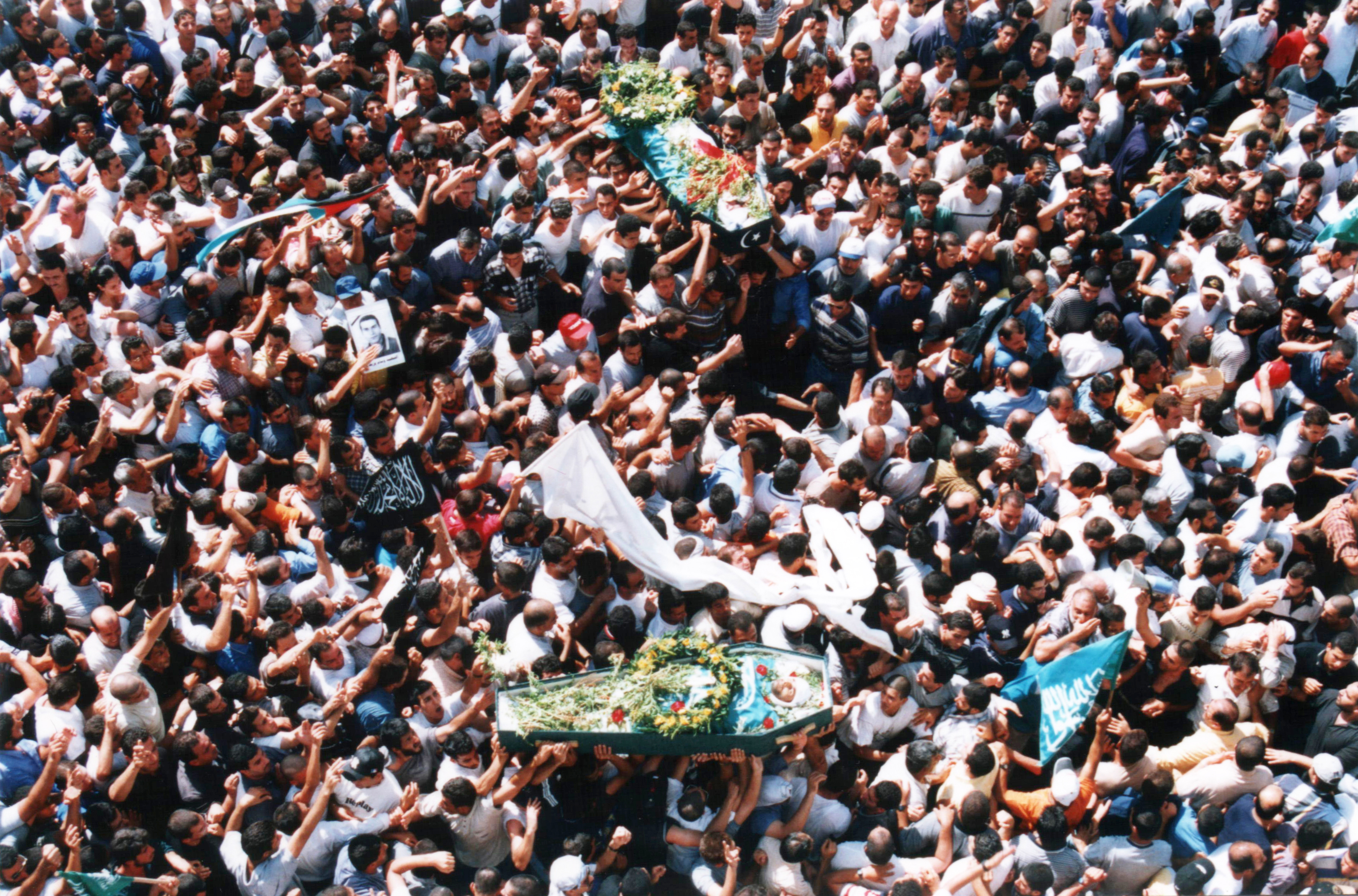
Mass funerals were held for the 13 Palestinians killed by Israeli police in October 2000. (Photo: Adalah)
PID investigates the killings: No grounds for indictments
As a next step, the commission ordered the Israeli Justice Ministry’s Police Investigations Department (PID) to investigate the killings in order to determine criminal responsibility. Adalah undertook extensive correspondence with PID and the attorney general (AG) regarding their duty to implement the Or Commission’s recommendations, and demanded the prosecution of those found responsible for the deaths.
In September 2005, PID published its final report on its investigation, claiming that a lack of sufficient evidence meant that there were no grounds for indicting any police officer or commander for any of the 13 killings. (CLICK HERE for Adalah's initial English-language analysis of the PID report). These conclusions directly contradict those reached by the Or Commission and the fact that significant amounts of evidence were made available to PID by the commission.
In general, PID failed to conduct prompt, complete, or independent investigations and its report was roundly criticized for justifying violence against Palestinian Arab citizens of Israel. Leading jurists argued that PID’s conclusions were unreasonable and fundamentally contradicted the recommendations of the Or Commission. Supreme Court Justice Theodor Or, for example, himself sharply criticized PID in a speech that he gave at Tel Aviv University a year after the release of the report, contending that, “The PID did not collect any evidence on the events surrounding the killings of citizens, did not gather evidence at the scene, and did not attempt to locate any police officers involved in the incidents shortly after they occurred.” In March 2006, UN Special Rapporteur on Extrajudicial, Summary and Arbitrary Executions Professor Philip Alston questioned PID’s decision to close its investigation into the deaths without issuing a single indictment, in his report to the 62nd Session of the Commission on Human Rights.
Attorney General reviews PID: Complete impunity for police
As a result of intense public pressure, Israeli AG Menachem Mazuz decided to review PID’s decision, and to this end appointed a special investigatory committee within the State Attorney’s Office. The decision to review the PID’s report within the State Attorney’s Office lacked any integrity because the office was headed by then-State Attorney Eran Shendar, who was the PID director during October 2000 and bears direct responsibility for its failure to open immediate investigations into the killings.
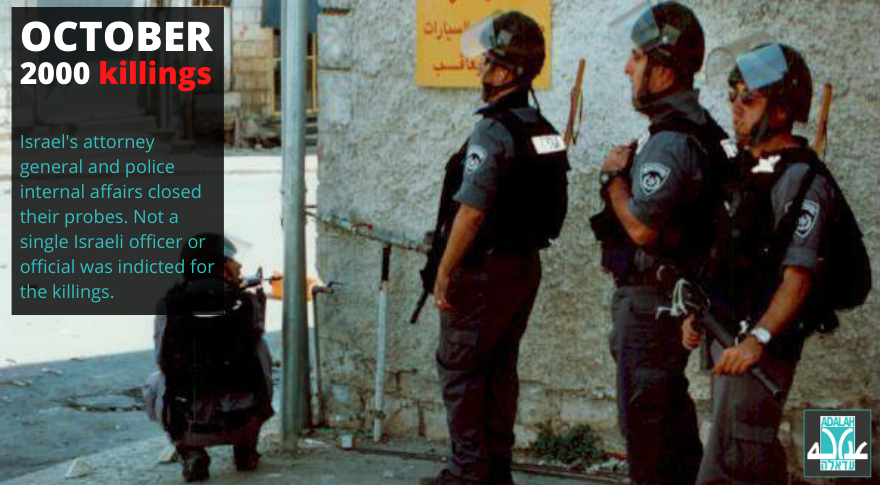
In October 2006, Adalah submitted a comprehensive 133-page report to the AG, entitled The Accused, which addressed the shortcomings and failings of Israeli law enforcement authorities in investigating the killings. The main findings of The Accused are that PID: did not conduct any investigation into five of the killings; investigated other killings in a negligent and incompetent manner; reached opposite conclusions to those of the Or Commission in many cases, even though it did not present a shred of new evidence; and hid the fact that police officers had refused to cooperate with it, including a refusal to undergo polygraph tests. Adalah demanded an investigation into PID for breach of trust and damaging public confidence.
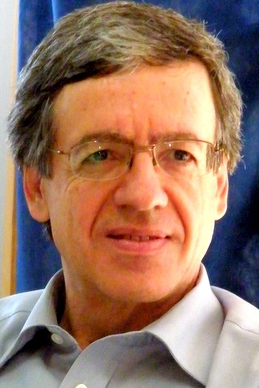 The AG issued his report in January 2008, announcing that none of the police officers or commanders involved in the fatal shootings of Palestinians in October 2000 would be prosecuted. Endorsing PID’s report, Mazuz agreed that there was a lack of sufficient evidence to issue criminal indictments against police officers and commanders. In contradiction to the Or Commission’s findings, he also found that the police who shot the victims did face direct threats to their lives, which he claimed necessitated the use of operational judgment and negated criminal responsibility. Thus, even if it could be proven that individual police officers had fired the lethal bullets, it could still be argued that the shootings were justified. The AG’s report perpetuated the state’s perception of Arab citizens as enemies of the state, and supported the view that the police have wide discretion to open fire at them. As UN Special Rapporteur Philip Alston found, in a report presented to the UN Human Rights Council in May 2008, the decision of Israeli AG Mazuz’s decision not to issue indictments “would appear to fall short of international standards.”
The AG issued his report in January 2008, announcing that none of the police officers or commanders involved in the fatal shootings of Palestinians in October 2000 would be prosecuted. Endorsing PID’s report, Mazuz agreed that there was a lack of sufficient evidence to issue criminal indictments against police officers and commanders. In contradiction to the Or Commission’s findings, he also found that the police who shot the victims did face direct threats to their lives, which he claimed necessitated the use of operational judgment and negated criminal responsibility. Thus, even if it could be proven that individual police officers had fired the lethal bullets, it could still be argued that the shootings were justified. The AG’s report perpetuated the state’s perception of Arab citizens as enemies of the state, and supported the view that the police have wide discretion to open fire at them. As UN Special Rapporteur Philip Alston found, in a report presented to the UN Human Rights Council in May 2008, the decision of Israeli AG Mazuz’s decision not to issue indictments “would appear to fall short of international standards.”
Ongoing lack of accountability and justice
Following the release of the AG’s report, the High Follow-up Committee for Arab Citizens in Israel (HFC) called for the investigations to be reopened and for the establishment of an independent committee with the power to indict. However, the HFC decided that all legal proceedings in Israel had been exhausted, and that it would thereafter focus its October 2000 advocacy on the local and international public spheres. In 2008, Adalah participated in a series of visits to South Africa with the families of the October 2000 victims to examine truth and justice-seeking mechanisms and initiatives to memorialize the victims of apartheid in South Africa. Adalah’s lawyers also traveled to South Africa with Arab Knesset members to learn about constitution-building processes, and with political leaders and academics to study the struggle against apartheid.
On the tenth anniversary of the October 2000 killings, Adalah embarked on an intensive program of local and international commemorative events. It raised the case repeatedly before UN and EU bodies, and published a public petition in Israel’s Haaretz daily newspaper with the signatures of 513 Arab and Jewish lawyers in Israel. Adalah also held three public events in Haifa, Tel Aviv, and Tira, and published and distributed 3,000 copies of a booklet in Arabic on the October 2000 events and the legal struggle against impunity.
In January 2011, Adalah published a follow-up report entitled The Accused – Part II: Failures and Omissions by the Attorney General in Investigating the October 2000 Events. In the report, Adalah concludes that the AG’s decision to close the investigation files was gravely flawed and upheld the immunity granted by PID to the police officers and commanders implicated in the killings. Adalah also demanded that the investigations into the killings should be reopened and transferred to an independent, professional, and neutral body that should act in accordance with Israeli and international law. In February 2011, Adalah briefed UN High Commissioner for Human Rights Navi Pillay on the October 2000 events and their aftermath during her visit to Israel and the OPT, and requested her intervention to secure accountability for the families of the victims.
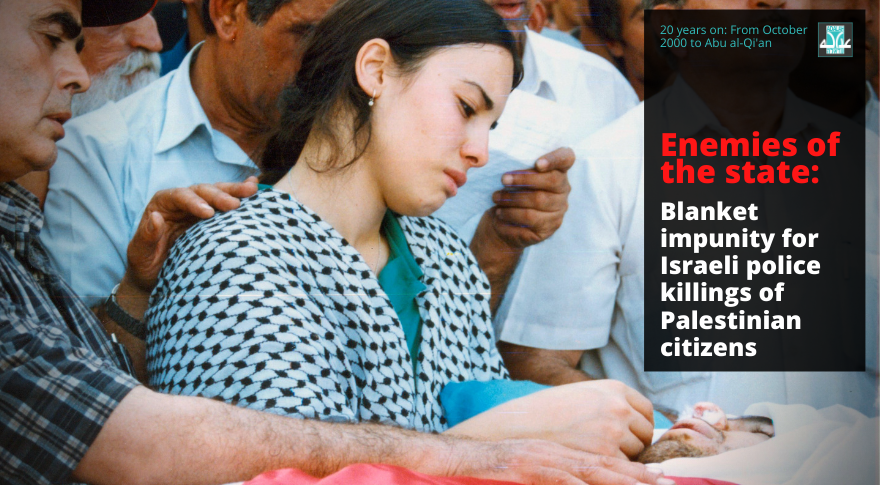
The commemoration of 20 years since October 2000 comes at a time of new developments regarding the 2017 Israeli police killing of Ya’akub Abu al-Qi’an, a 50-year-old teacher. There is a direct link between the closure of the Abu al-Qi’an case and the October 2000 cases, since both rely on the same policy of no criminal charges filed against law enforcement authorities, including the police, in cases involving the killing of Palestinian citizens of Israel. CLICK HERE or on the above photo for more.
However, those responsible for the October 2000 killings continue to shelter behind the wall of impunity built for them by Israeli state authorities, leaving the victims and their families without a remedy. This impunity also has a collective aspect, as it leaves all Palestinian Arab citizens of Israel vulnerable to state violence and encourages the recurrence of grave human rights violations against them. In short, justice was not served, lessons were not learned, and there has been no personal liability for any of those responsible for the lethal shootings. The root causes of Israel’s killings of the 13 Palestinians in October 2000 have therefore not been eradicated.
CLICK HERE or on the above image to read op-eds from Adalah staff about the impact of the October 2000 events.
Despite Israel’s repeated failures to deliver truth and justice to the Palestinian Arab community in Israel for the October 2000 killings and the enormous obstacles to accountability that remain, the victims’ families, Adalah, other civil society organizations, and the Palestinian Arab political leadership in Israel continue to advocate at home and abroad for justice and accountability.
The 13 Palestinians killed by Israeli police forces in October 2000
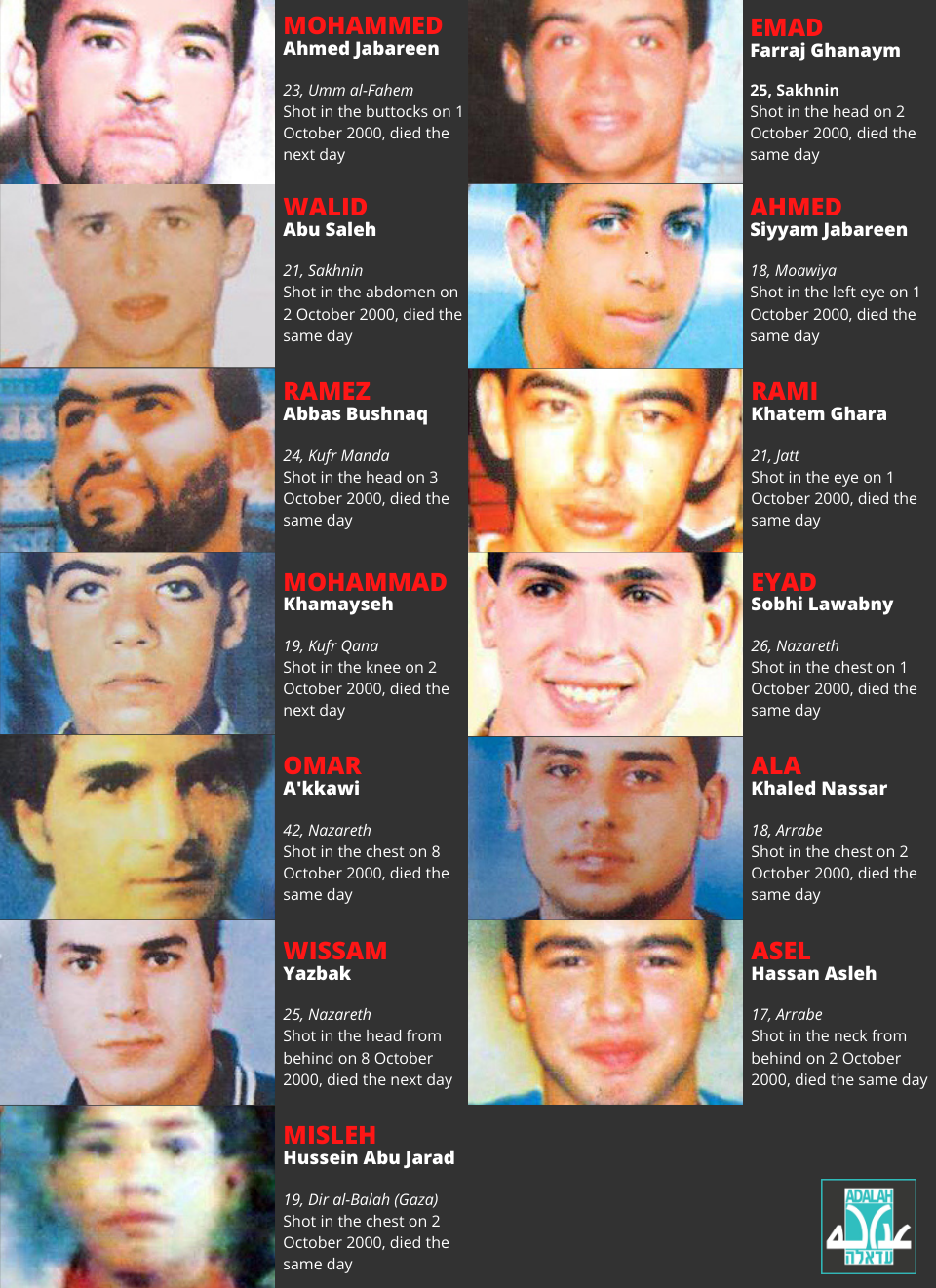
Adalah’s Key Reports
 October 2000 - Law and Politics before the Or Commission (2003)
October 2000 - Law and Politics before the Or Commission (2003)
This report presents the key issues raised in the concluding arguments submitted on 5 December 2002 by Adalah to the official Or Commission of Inquiry into the October 2000 protest demonstrations.
The report reveals PID’s failure to continue investigating the killings, demonstrates how PID concealed essential facts from the public and issued a falsified report, and illuminates the masked and undeclared “collaboration” between PID investigators and some of the police officers under investigation.
 The Accused: Part II (2011)
The Accused: Part II (2011)
The report evaluates the facts, offical conduct, evidentiary standards, evaluations, and conclusions and ultimately finds the Israeli attorney general's decision to close investigation files deeply flawed.
The Or Commission Report (2003)
Following a thorough review and study of the 831-page report of the Commission of Inquiry, headed by Justice Theodor Or, Adalah has many reservations regarding numerous issues raised - in particular, the commission's lack of conclusive recommendations regarding the killings. Despite this, it is Adalah's opinion that the Or Commission report is an important official document, and its recommendations should be implemented immediately.
- Available in Hebrew and English (summary)
- Adalah’s official position on the Or Commission
The PID Report
- 18 September 2005: PID Report (Hebrew)
- 22 September 2005: Adalah's Initial Analysis of the PID Report
- 18 September 2005: Committee of the Victims' Families Response to the PID
- 14 October 2005, Commentary by Dr. Marwan Dwairy, Chair of Adalah Board of Directors, "October 2000: Defined Goals and New Mechanisms"















